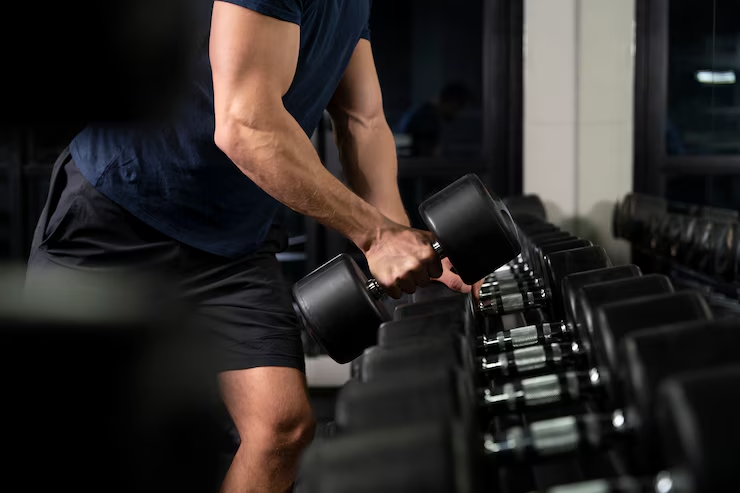Staying fit in 2025 isn’t about chasing extreme body goals or falling for the latest fitness trends. Instead, it’s about developing habits that are realistic, consistent, and long-lasting. With more people spending time in front of screens and working from home, the need for intentional movement and smart health choices has never been greater.
As technology advances and life becomes more convenient, our daily routines often lead to less physical activity and more sitting. That’s why going back to the basics—simple, proven habits that support strength, health, and energy—is essential. These habits don’t require perfection, just steady effort and a focus on progress over time.
Whether you’re just beginning or want to upgrade your current routine, the right habits can make all the difference. From smart movement and better nutrition to quality sleep and mental wellness, these ten daily practices will help you stay consistent, feel energized, and build the kind of fitness that lasts well beyond 2025.
Train 4-5 Times a Week

Consistency is the foundation of any successful fitness journey. It’s not about doing the most in the shortest time but about showing up regularly and building momentum. Committing to working out 4 to 5 times a week offers the ideal balance between pushing your body and allowing it to recover. Over time, this rhythm becomes a sustainable lifestyle rather than a short-term fix. And when you stay consistent, your results multiply—whether you’re looking to build strength, lose weight, improve energy levels, or simply feel better in your own skin.
Fitness isn’t one-size-fits-all, and your weekly routine doesn’t have to be rigid or repetitive. While resistance training plays a key role in building muscle and boosting metabolism, it’s equally important to include a variety of movements. Incorporate cardiovascular workouts to strengthen your heart, mobility exercises to enhance flexibility, and fun activities like dance, yoga, or martial arts to keep you motivated. This balanced approach keeps your fitness journey exciting, prevents burnout, and supports long-term physical and mental well-being.
Why it works:
Builds muscle and burns fat consistently
Enhances cardiovascular health
Reduces the risk of lifestyle diseases
Boosts mental health and reduces stress
Pro Tip: Plan your weekly schedule every Sunday. Mix strength training (3x/week) with cardio or active recovery days (2x/week) such as walking, cycling, or yoga.
Sleep 7–8 Hours Daily
No matter how dedicated you are to training or eating clean, without quality sleep, your fitness progress will stall. Sleep is a crucial part of recovery that many people overlook. It’s during deep, restful sleep that your body repairs muscle tissue, replenishes energy stores, and regulates vital hormones like cortisol and growth hormone. Without enough sleep, your body struggles to bounce back from workouts, making it harder to build strength, lose fat, or stay motivated to continue your fitness journey.
In addition to physical recovery, sleep plays a major role in mental focus, mood, and decision-making—all of which affect your overall fitness performance. A well-rested brain helps you stay committed to your goals, make smarter food choices, and approach workouts with more energy and enthusiasm. Prioritizing 7 to 9 hours of quality sleep each night isn’t a luxury—it’s a non-negotiable part of any successful fitness plan. When you combine solid training, good nutrition, and consistent sleep, your results improve naturally and sustainably.
The science:
Growth hormone peaks during deep sleep, aiding muscle recovery
Sleep deprivation increases cortisol and ghrelin, which promotes fat gain and hunger
Poor sleep reduces insulin sensitivity and cognitive function
How to improve your sleep:
Set a consistent bedtime and wake-up time
Avoid screens an hour before bed
Keep your room cool and dark
Try magnesium supplements or herbal teas if needed
Eat 100g+ of Protein Daily

Protein is one of the most essential nutrients when it comes to achieving your fitness goals. It plays a key role in building and maintaining muscle, supporting post-workout recovery, and keeping you feeling full for longer periods. Whether you’re trying to gain strength, lose fat, or simply improve your overall health, getting enough protein each day helps your body repair tissues and function at its best.
No matter your dietary preference—plant-based, vegetarian, or omnivorous—prioritizing protein can significantly enhance your fitness progress. From lentils and tofu to chicken and eggs, there are plenty of protein-rich options to suit your lifestyle. Including a good source of protein in every meal helps stabilize your energy levels, reduce cravings, and support muscle preservation, especially during fat loss. Make protein a consistent part of your daily routine, and you’ll notice better results in your strength, performance, and recovery, making your entire fitness journey more effective and sustainable.
Benefits of higher protein intake:
Preserves lean muscle during fat loss
Boosts metabolism through the thermic effect of food
Enhances recovery and reduces soreness
Where to get your protein:
Animal sources: chicken, eggs, beef, Greek yogurt, fish
Plant sources: tofu, lentils, quinoa, tempeh, legumes
Supplements: whey, casein, or plant-based protein powders
Aim for 1.6–2.2 grams of protein per kilogram of body weight if you’re training regularly.
Never Skip Warm-Up
Warm-ups may not be the flashiest part of your fitness routine, but they are one of the most important. Taking just 5 to 10 minutes to prepare your body for movement can make a huge difference in how you perform during a workout. A proper warm-up increases blood flow, activates key muscle groups, and improves joint mobility—helping your body transition smoothly from rest to activity. More importantly, it signals to your mind that it’s time to focus and get serious.
Skipping this essential step can lead to a higher risk of strains, pulls, or more serious injuries, especially during high-intensity or strength-based workouts. It can also leave you feeling sluggish or unmotivated during your session, which impacts your overall fitness progress. Whether you’re lifting weights, running, or doing a fitness class, warming up properly primes your body and mind for success. It’s a small habit that delivers big benefits, especially when consistency and performance matter most.
What a good warm-up includes:
Dynamic movements (leg swings, arm circles, hip openers)
Mobility drills (foam rolling, light yoga stretches)
Movement-specific drills (bodyweight squats before barbell squats)
Time investment: Spend at least 5–10 minutes warming up. Not only does this reduce injury risk, but it also improves workout quality and your mind-body connection.
Track Your Workouts

In any fitness journey, what gets measured truly gets managed. Tracking your workouts is one of the simplest yet most effective ways to stay accountable and see consistent progress. Whether you’re logging sets, reps, weights, or cardio sessions, having a clear record shows how far you’ve come and helps guide where you’re going. It turns your fitness routine into a measurable plan, rather than guesswork.
Keeping track of your workouts also helps you spot plateaus or performance dips early, so you can adjust your routine before losing momentum. It’s also incredibly motivating—watching your improvements over time, whether it’s lifting more weight or running faster, builds confidence and keeps you engaged. Fitness isn’t just about working hard; it’s about working smart. By tracking your workouts, you make your efforts more effective and ensure every session contributes to long-term results. Even a simple notebook or fitness app can make a big difference in how focused and successful you are.
Benefits of tracking:
Helps maintain progressive overload
Increases accountability and motivation
Allows you to spot weaknesses or imbalances
Tools you can use:
Journals and notebooks
Apps like Strong, MyFitnessPal, or Trainerize
Smartwatches and fitness trackers
Tracking doesn’t need to be complex—simply logging sets, reps, weights, and how you felt can be a game-changer.
Stay Consistent, Not Perfect
Perfection isn’t the goal—progress is. Life can be messy, and your fitness routine won’t always go according to plan. There will be holidays, busy schedules, missed workouts, and moments when motivation is low. That’s completely normal. What truly matters is your ability to keep showing up, even when things aren’t perfect. One off day won’t ruin your results, but giving up altogether will.
Fitness is a long-term journey, not a quick fix. The people who succeed aren’t the ones who never slip up—they’re the ones who stay consistent over time. They adjust, adapt, and keep moving forward no matter what life throws at them. Building a strong fitness foundation means accepting the ups and downs and staying committed through all of it. Don’t wait for the perfect moment or ideal conditions. Just keep going, and over time, your steady effort will lead to powerful, lasting results that are well worth the work.
Mindset shift:
Consistency: 80% effort over time = long-term success
Perfection: 100% effort for a short burst = burnout and failure
How to stay on track:
Have a flexible training plan
Set small, achievable weekly goals
Celebrate progress, not perfection
Missing one workout isn’t failure. Quitting after a missed workout is. Be kind to yourself and recommit.
Limit Junk Food to 1–2x a Week
You don’t have to eliminate junk food entirely to stay on track with your fitness goals, but learning to limit it is essential. Many modern ultra-processed foods are packed with empty calories, loaded with sugar and unhealthy fats, and offer very little nutritional value. While they may taste good in the moment, they can disrupt your hunger cues and leave you feeling sluggish and unsatisfied shortly after.
Regularly consuming these types of foods can sabotage your energy levels, digestion, mood, and overall physique. They make it harder to stay consistent with your fitness routine and often lead to cravings and overeating. Instead of cutting them out completely, try to enjoy them in moderation while focusing on whole, nutrient-rich foods most of the time. Balancing enjoyment with discipline allows you to fuel your body properly, perform better during workouts, and see lasting results without feeling deprived or restricted in your fitness journey.
Why it matters:
High-sugar, high-fat foods cause energy crashes
Regular junk intake impairs gut health and insulin sensitivity
It becomes harder to hit protein and nutrient targets
Practical strategy:
Pick 1–2 “treat meals” per week (not full cheat days)
Don’t keep junk in the house
Find healthier swaps: protein ice cream, air-popped popcorn, dark chocolate
Eat clean 80–90% of the time, and enjoy your favorite indulgences in moderation.
Walk After Every Meal

Walking after meals is a simple yet powerful habit that can greatly support your fitness goals. While it’s often overlooked, a short walk—just 10 minutes after eating—can significantly improve digestion by helping food move through your system more efficiently. It also helps regulate blood sugar levels, reducing energy crashes and cravings that can follow a large meal.
Including post-meal walks into your daily routine can also support weight management by increasing calorie burn and preventing fat storage spikes that occur after heavy meals. This small activity can lead to big benefits over time, especially when combined with a consistent fitness routine. Plus, it’s an easy way to stay active without needing a gym or equipment. Whether you’re aiming to lose fat, improve energy, or simply feel better day to day, post-meal walking is a low-effort habit with high-impact results that fits easily into almost any lifestyle.
Why post-meal walks work:
Improves glucose control, reducing insulin spikes
Aids digestion by stimulating intestinal contractions
Increases daily calorie burn (NEAT: Non-Exercise Activity Thermogenesis)
How to implement:
Walk 10–15 minutes after breakfast, lunch, and dinner
Use it as a chance to unplug or listen to a podcast
Grab a friend or family member for extra accountability
Cumulatively, this can add up to an extra 150+ minutes of movement per week—without hitting the gym.
Focus on Form, Not Ego
Lifting heavier weights might seem like the key to faster fitness results, but it’s not effective if your form is compromised. Prioritizing good technique over lifting heavy numbers is essential for ensuring safe and effective workouts. When you focus on proper form, you activate the right muscles and reduce the risk of injury, which is crucial for long-term progress.
Sloppy form can lead to unnecessary strain on joints and muscles, ultimately hindering your fitness journey. It may even set you back by causing injuries that force you to take time off from training. By practicing controlled movements and perfecting your technique, you build a solid foundation for strength that supports long-term gains. Remember, consistency, not just lifting heavy, is the key to sustainable fitness progress. Focusing on form over numbers ensures that you’re not only safe but also optimizing your workouts to get the best possible results
The danger of ego lifting:
Poor form strains joints and ligaments
You miss the muscle you’re trying to train
Increases risk of long-term injury and burnout
What to do instead:
Master bodyweight movements first
Use mirrors or film yourself for feedback
Ask for a coach’s input or get a form check online
Remember: the gym is not a competition—it’s a practice. Proper form is always a win.
Stay Hydrated All Day
Hydration is one of the most fundamental habits for fitness, yet it’s often overlooked. Drinking enough water affects nearly every aspect of your health—from energy levels and digestion to muscle recovery and overall performance. Staying properly hydrated ensures your body functions at its best, allowing you to feel more energized and focused during workouts.
When you’re dehydrated, your body struggles to perform, and recovery slows down. It can also lead to digestive issues and hinder muscle function, making it harder to see the results you want from your fitness efforts. By making hydration a priority, you can improve your fitness outcomes, support faster recovery, and boost your energy for better performance. So, keep water on hand throughout the day to stay at your best and get the most out of every workout.
The science:
Water makes up 60% of your body and fuels every cellular process
Dehydration reduces strength and endurance
Proper hydration improves skin, brain function, and metabolism
Daily hydration targets:
Men: ~3.7 liters/day
Women: ~2.7 liters/day
(These numbers include water from food and other drinks)
Hydration hacks:
Start your day with 500ml of water
Use a smart water bottle or app to track
Flavor water with lemon, mint, or electrolytes to make it enjoyable
If you’re thirsty, you’re already dehydrated. Don’t wait—sip throughout the day.
Final Thoughts

Fitness in 2025 is all about sustainability, not following the latest trends. These 10 habits are simple yet powerful tools that can transform your energy, body, and overall well-being when practiced consistently. Rather than chasing perfection, focus on gradual progress. Start with just 2–3 habits and make them a routine.
As you master these initial habits, you can add more over time, building a solid foundation for long-term fitness success. The key is consistency, not perfection. By focusing on habits that fit into your lifestyle, you’ll see dramatic changes in your energy levels, performance, and overall fitness, setting you up for lasting results. Start small, stay focused, and let these habits reshape your fitness journey.
FAQs
What are the best fitness habits for beginners ?
Start with simple habits like regular exercise, staying hydrated, and eating balanced meals. Gradually add more as you progress.
How do I stay consistent with my fitness routine ?
Focus on building a routine you enjoy, track your progress, and start small. Consistency comes from setting achievable goals.
Can I see results with just 2–3 fitness habits ?
Yes! Starting with a few habits and mastering them before adding more can lead to lasting results over time.
How important is hydration for fitness ?
Hydration is crucial. It supports energy, digestion, recovery, and overall performance, making it a key habit in any fitness journey.
Do I need to follow fitness trends to stay in shape ?
No, sustainability is key. Focus on habits that work for your lifestyle rather than jumping on every new fitness trend.


